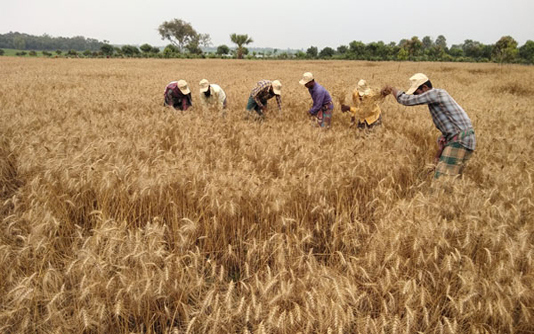RAJSHAHI, June 2, 2020 (BSS) – Farmers have harvested around five lakh tonnes of wheat in Rajshahi division supplementing the government efforts of ensuring food security amid the present COVID-19 pandemic situation.
The farmers got the wheat yield from about 1.40 lakh hectares of land in all eight districts in the division during the recent past harvesting season.
According to the official sources of the Department of Agriculture Extension (DAE), the growers were seen delighted as they got good yield due to favourable weather conditions everywhere in the region, including its vast Barind tract.
They are also getting a fair price for their produce this season at the present change coupled with a troubled situation.
In the present context of COVID-19 pandemic, the demand of wheat and its flour has been enhanced to a greater extent as many of the government, non-government and volunteer organizations are seen distributing flour along with other food items as relief among the jobless and other hard hit families.
Wheat is being sold at Taka 26 to 27 per kilogram while open flour at Taka 28 to 29 and packet flour at Taka 31 to 32 per kilogram in the local markets at present, said Raihanul Kabir, Regional Controller of Foods.
The Department of Food has procured 4,940.60 tonnes of wheat till Monday last against the current season’s total procurement target of 30,323 tonnes.
It has also sold 12,290.47 tonnes of flour among the jobless and less-income people at Taka 18 per kilogram through 54 dealers in the division till the same day to tackle the present livelihood related hardships triggered by the pandemic.
Tasiqul Islam, 48, a farmer of Chandlai village under Godagari Upazila, said he had cultivated wheat on 12 bigha of land and the yield was good as sheaf of almost all of the plants were mind-blowing during the harvesting time than the previous seasons.
Islam got 12 to 15 mounds of yield from per bigha of land on an average and sold those at Taka 1,000 to Taka 1,050 per mound in local markets.
Abu Kalam, another farmer of Nandangachhi village under Charghat Upazila, echoed the same in terms of the yield and market price.
He said climate coupled with topographic conditions was suitable for the cash crop since the initial stage of its farming.
Kalam said timely sowing of seeds accompanied by the cold spell, has also been considered as a positive sign for attaining a bumper production of the cash crop.
He continued that many farmers got three to four mounds more yield from per bigha of land in comparison to the previous season.
The DAE had disbursed seeds and fertilizers worth around Taka 3.38 crore free of cost among 17,000 poor and marginal farmers for wheat farming under the government’s agricultural incentive programme in the division, said Sudhendra Nath Roy, Additional Director of DAE.
Various other government and non-government entities had adopted diversified steps to make the farming a total success in the region as it is suitable for the crop for its water-saving and drought tolerant features.
Barind Multipurpose Development Authority (BMDA), an ever-largest irrigation providing state-run organization in the country’s northwest region, also provided necessary irrigation to the farming fields.
Rajshahi Regional Office of Bangladesh Wheat and Maize Research Institute (BWMRI) had developed 320 demonstration plots on farmers’ fields.
320 farmers were given 5.5 tonnes of breeder seeds and 8.5 tonnes of seeds of some high yielding, heat and drought tolerant and blast disease resistant varieties like BARI Gom 28, 29, 30 and 33 along with recommended fertilizers for the projection plots free of cost.
The farmers including 69 field-level DAE officials were given need-based training to boost wheat production after the best uses of the modern seeds and technologies.
Dr Ilias Hossain, Principal Scientific Officer of BWMRI, told BSS that the BARI gom 33 is the highest blast disease resistant variety, zinc-enriched, large grain size and high yielding (20 maunds per bigha).



